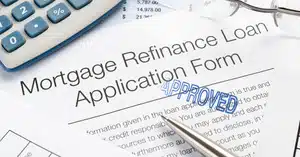Mortgage Refinancing – Unleashing Financial Potential
Unlocking opportunities through mortgage refinancing could be a strategic and smart decision. It is important to note that this might not be the best move in every situation. In this article, we will cover some intricacies of this strategy and promote understanding which is crucial before you act. We offer insights into when it is advantageous to refinance your mortgage, how often you should consider it, and why it could be a worthwhile option, even in a high-interest-rate market.

The Basics of a Mortgage Refinance
Before delving into the specifics, let us start with a fundamental understanding of what we mean with a mortage refinance. Put simply, it is when you replace your mortgage with a new or different one, likely with better terms or rates or features. You can refinance with your existing bank or by changing to a different one.

Identifying the Ideal Time for Refinancing
Timing is crucial in uncovering opportunities. The optimal timing for refinancing depends on several factors, including your financial situation, the current interest rates, and your long-term goals. Here are some common scenarios when a mortgage refinance may make sense.
1. Falling Interest Rates
When market interest rates drop significantly below your existing mortgage rate, refinancing can lead to savings on interest costs.
2. Improved Credit Score:
If your credit score has improved since taking out your original mortgage, you may qualify for better loan terms and lower interest rates. A perfect example of this scenario might be when you first obtained your home loan, you were placed by a second-tier lender, which has a higher interest rate. Over time, your credit scores improve and your broker might be able to refinance to a mainstream bank offering more competitive interest rates.

How Frequent Should You Refinance?
There is no set rule for how often you should refinance in New Zealand. It is, however, important to be aware of, and consider, both the costs and benefits. In some cases refinancing may not be your best option. Generally, a good rule of thumb is to assess your mortgage every two years at least, or whenever there’s a significant change in your financial circumstances or the market.
1. Change in Personal Financial Situation
A significant change in your income, such as a salary increase or even a new job, can make you eligible for better terms. Life events such as a split in relationship is often a springboard for refinancing.
2. Changes in the Market – Equity Growth
Once your home’s value has increased, and you have worked the mortgage down, you may have built up substantial equity. Refinancing can help you access equity for home improvements, debt consolidation, or other investment opportunities.

10 Advantages of Refinancing Your Mortgage
- 1. Lower Monthly Payments: One of the most apparent advantages of refinancing is the potential for lower monthly mortgage payments. By getting a lower interest rate, you can reduce your monthly expenses, freeing up funds for some other financial goals.
- 2. Interest Savings: Lower interest rates can translate into significant long-term savings. Even in a high-interest-rate market, switching to a more favourable rate can lead to substantial savings.
- 3. Debt Consolidation Benefits: For those who are battling with high interest rates and large debt loads, refinancing your mortgage may be helpful. Platinum Mortgages Mortgage Brokers specialise in refinancing and can assist clients saving their homes and debt consolidation. This could be an effective strategy for consolidating high-interest debt. Examples of high interest debt incudes, credit card balances or personal loans. These could be consolidated into your mortgage. This can result in a lower overall interest rate, making it easier to manage your debt.
- 4. Accessing Home Equity For Life Events: As your home’s value increases over time, you build equity. Refinancing allows tapping into this equity for various purposes, including home improvements or education expenses and other life events.
- 5. Flexible Loan Term Adjustments: Refinancing gives you the flexibility to adjust your loan term. You could either shorten it to pay off your mortgage faster and build equity more quickly or lengthen it to reduce your monthly payments.
- 6. Enhancing Loan Features: A refinance enables you to change the features of your mortgage. You can change the loan structure from an interest-only loan to a principal and interest loan or add features like an offset account or redraw facility.
- 7. Escaping High-Interest Loans: In a high-interest-rate market, refinancing can help you escape the burden of a high-interest loan. Switching to a lower interest rate can provide significant relief to your budget. Nowadays, some are already paying in excess of 10% interest on their personal loans or credit cards.
- 8. Reducing Financial Stress: It is stressful to try and juggle multiple debts simultaneously. Refinancing can simplify your finances by consolidating multiple debts into one mortgage payment. This then makes it easier and less stressful to manage your financial obligations.
- 9. Creates Investment Opportunities: Accessing equity through refinancing can open up further investment opportunities. This may be the likes of purchasing additional properties or investing in stocks and bonds.
- 10. Tax Advantages or Benefits: In some instances, such as if you have a new build, interest paid may be tax-deductible. Consult a tax professional to determine if you qualify for these benefits.

A Streamlined Process to Improve your Financial Position
Step 1: Financial Review
Expert assessment whether a refinance is a viable option or not is best left with the experts so consult your mortgage broker who will conduct the assessment for you.
Step 2: Mortgage Application – Find Out if Refinancing Your Mortgage Is The Best Option For You
Your broker will ask you for the required documentation. Once submitted, they do all the paperwork and submit your application to the most appropriate lender.
Step 3: Approval and Settlement
Once approved you will get a loan offer, you sign the required loan acceptance. Settlement is when your existing mortgage is paid off and replaced by a new one.

Conclusion
Unlocking opportunities through strategic changes to loan structures could be a clever move, and maybe not. When to refinance depends on your unique circumstances. It is however essential to monitor the market and your financial situation regularly.
Even in a high-interest-rate market, refinancing can lead to lower monthly payments. Furthermore, significant interest savings and access to your home’s equity. It is a valuable strategy for optimizing your financial well-being and achieving your long-term goals.
To explore whether refinancing is a good option for you, consult your trusted mortgage broker. They will guide you through the process and help you make informed decisions.